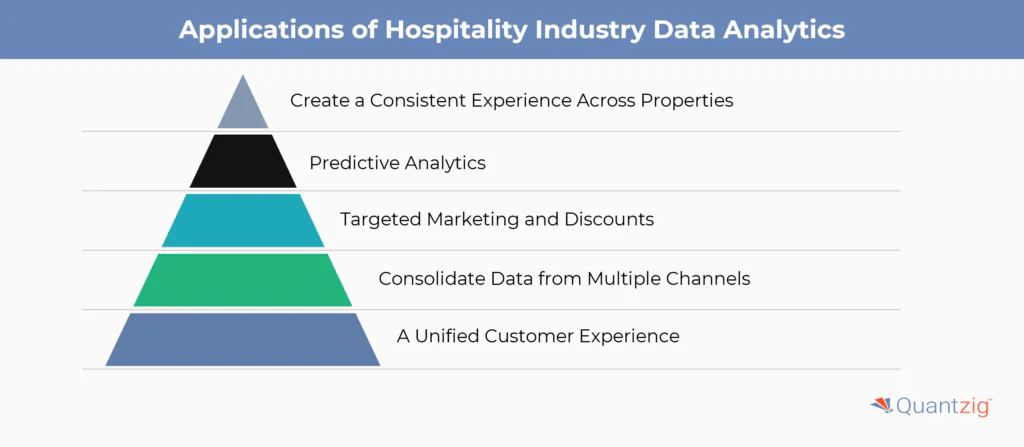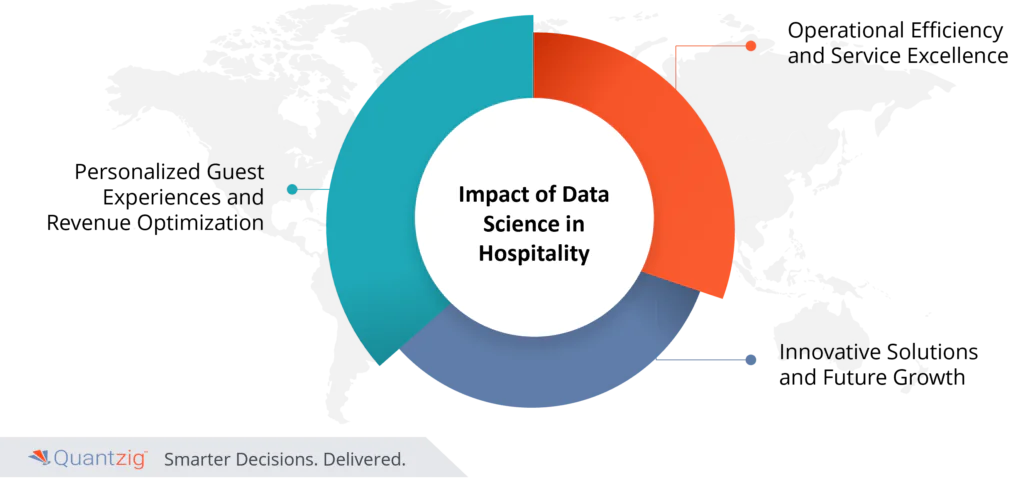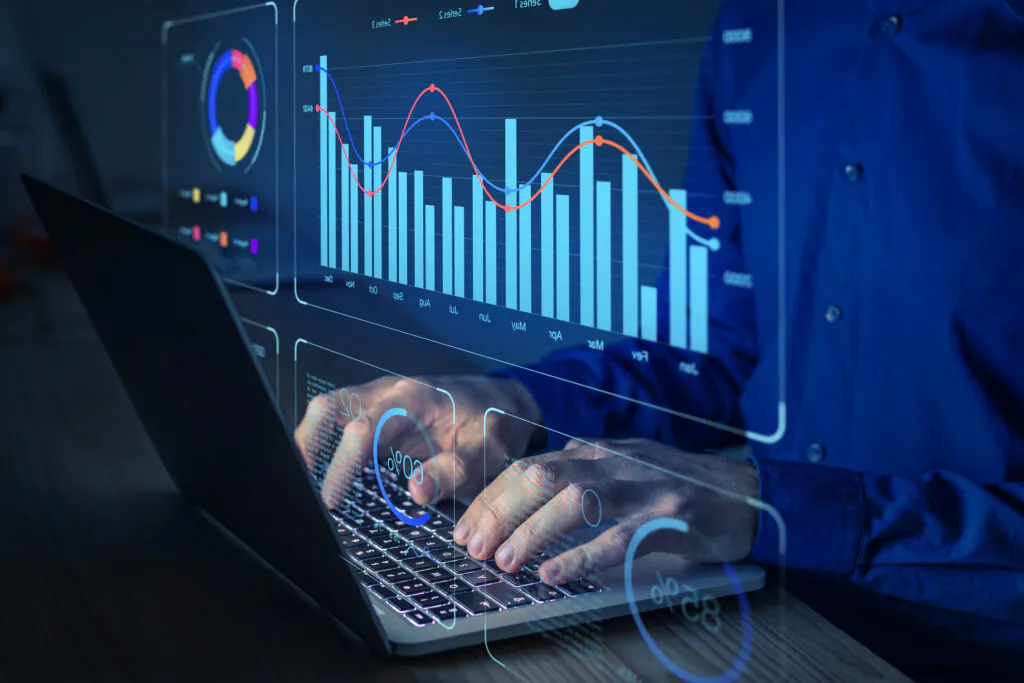Written By: Associate Vice President, Analytics and Data Strategy, Quantzig.
Table of Contents
An Introduction to Data Analytics in Hospitality Industry
Attracting new customers and encouraging them to return are constant challenges faced by the hospitality industry players. Market trends in hospitality analytics provides the potential customers with a wide range of options to choose from, it is essential to find effective ways to stand out from the crowd. Customer analytics solutions can prove to be very effective here – identifying problem areas and improving marketing efforts. Here are some ways data analytics can help boost the hospitality business.
Book a demo to experience the meaningful insights we derive from data through our travel analytics tools and platform capabilities. Schedule a demo today!
Request a Free Demo
Understanding Data Analytics in the Hospitality Industry
Data analytics plays a crucial role in enhancing operations and boosting profitability for hotels, resorts, and restaurants. Quantzig, as an expert in this domain, transforms vast amounts of data into actionable insights, enabling smarter decision-making and improved customer experiences.
In the hospitality industry, data from bookings, transactions, loyalty programs, social media, and feedback is abundant. Quantzig leverages advanced techniques like machine learning (ML), artificial intelligence (AI), and predictive modeling to help businesses optimize room rates, manage inventory, and align staffing with demand. Our solutions also enhance menu offerings, personalize customer experiences, and track key metrics like Revenue Per Available Room (RevPAR) and customer satisfaction.
With Quantzig’s expertise, hospitality businesses can tailor their services, boost customer retention, and identify cost-saving opportunities, ensuring a competitive edge and sustainable growth.
The Impact of Data Analytics in Hospitality Industry
The hospitality industry is being transformed by data science, which enables businesses to personalize guest experiences, optimize operations, and drive growth. Below is an overview of how data science is reshaping the industry, with a focus on key areas that enhance customer satisfaction, boost revenue, and improve operational efficiency.
| Aspect | Description |
|---|---|
| Personalized Guest Experiences and Revenue Optimization | Businesses can use customer data like booking patterns and reviews to personalize guest experiences, while machine learning predicts and customizes offerings. Data science also helps optimize pricing and forecast demand through market trend analysis, maximizing revenue. Additionally, analyzing customer behavior and demographics enables targeted marketing campaigns, enhancing engagement across platforms. |
| Operational Efficiency and Service Excellence | Integrating data enables businesses to streamline operations, enhance performance metrics for hotels, decision-making, and improve efficiency. Data science also helps optimize staffing and identify training needs, boosting service quality and productivity. Additionally, monitoring reviews and feedback allows for better reputation management, improved guest experiences, and increased loyalty through personalized incentives. |
| Innovative Solutions and Future Growth | Adopting AI and machine learning enhances guest interactions with real-time support via chatbots and virtual assistants. Data-driven insights help businesses anticipate market changes and develop growth strategies using predictive analytics. Ensuring data privacy and security builds guest trust and maintains compliance, protecting sensitive information and adhering to industry standards. |
Big data analytics in hospitality industry is revolutionizing the hospitality industry by enabling businesses to enhance guest experiences, customer insights in hospitality, optimize operations, and drive growth. By adopting data-driven strategies and technologies, hospitality businesses can thrive in a competitive landscape, ensuring long-term success.

Experience the advantages firsthand by testing a customized complimentary pilot designed to address your specific travel analytics requirements. Pilot studies are non-committal in nature.
Request a Free PilotRevolutionizing Hospitality: Key Applications of Data Analytics

1. A Unified Customer Experience
Many customers use multiple devices when browsing, booking, and following up with hotels. It is therefore important not only to have a mobile-friendly site or app but also to ensure that a guest can transition smoothly from one platform to another. Their data should be easily accessible regardless of how they booked their stay or what device they are using to check reservations, etc. Creating a seamless, multi-platform experience will not only create a better booking experience and increase the likelihood of purchase but will also encourage the consumer to return the next time they go on vacation and need to make a booking.
2. Consolidate Data from Multiple Channels
Between travel agents, discount websites, and direct bookings, customers have multiple ways to find and book rooms and services. It is important to ensure that the business has all the necessary information about the guest’s reservation in order to provide good service. But this data is also very useful for analytics. Data from multiple channels can be used to determine how guests find the property, what they are looking for, and how to direct bookings could be increased.
3. Targeted Marketing and Discounts
Targeted marketing is a valuable tool. Not every guest is looking for the same things, and to send every customer the same promotions is to inundate people with the information they don’t care about. This can cause people to ignore promotions or leave mailing lists altogether. By using customer analytics solutions, it is possible to send each person only those promotions that are likely to interest them, resulting in higher conversion rates and improved customer satisfaction.
These analytics can also target site visitors, not just those on an email list. Analytics tools can identify first-time visitors and offer them a discount, for example. They can also track demographics such as age and region, making it possible to create more targeted ad campaigns based on that information.
4. Predictive Analytics
This is an invaluable tool in many industries. Rather than simply determine how successful a given initiative has been, predictive analytics in hotels can recommend the best course of action for future projects. They allow a business to “test” several options and determine which one is most likely to succeed or to estimate consumer reaction to a specifically planned initiative. Investing in strong analytics can save considerable amounts of time and money.
5. Create a Consistent Experience Across Properties
One way to improve customer loyalty and satisfaction is to make their data accessible to every property within a brand. If one hotel has learned of specific preferences and needs from a previous visit, that data should be accessible throughout the chain. This allows each hotel to take advantage of information that has already been collected, and to provide the customer with a consistent, seamless experience.
These are only a few of the ways that data analytics can improve business in the hospitality industry. Whether the focus is on conversions, retention, marketing, or other dimensions, analytics can create noticeable improvements when used strategically.
Transforming Hospitality: 7 Powerful Data Analytics Use Cases to Elevate Your Business
Data-driven decision making in hospitality is a game-changer in the hospitality industry, enabling businesses to gain insights into customer experiences, optimize operations, and stay competitive. Quantzig, with its deep expertise in data analytics, empowers hospitality companies to harness these insights for strategic decision-making and enhanced guest satisfaction. Below are seven key use cases where Quantzig’s expertise in data analytics with AI and machine learning in hospitality analytics can make a significant impact.
| Use Case | Description |
|---|---|
| 1. Optimize Revenue and Pricing Management | Quantzig helps companies aggregate and analyze customer and market data to optimize pricing strategies. By leveraging seasonal trends and market demand, organizations can implement competitive pricing models and promotions. |
| 2. Enhance Guest Experiences | Quantzig enables businesses to collect and analyze customer feedback from multiple sources, offering personalized and consistent guest experiences. By understanding guest preferences, companies can exceed expectations and build loyalty. |
| 3. Improve Marketing | Quantzig’s data analytics expertise supports targeted marketing campaigns by analyzing key performance indicators (KPIs). Organizations can identify the most effective channels, refine strategies, and improve ROI by appealing directly to their audience’s interests. |
| 4. Monitor Competitors | Quantzig provides insights into competitor pricing, customer feedback, and market positioning. This enables organizations to identify their competitive strengths and areas for improvement, ensuring they stay ahead in a crowded market. |
| 5. Identify New Products and Services | With Quantzig’s data analytics, businesses can track market trends and identify gaps in their offerings. This allows for the development of new products and partnerships that align with customer needs and preferences. |
| 6. Discover New Audiences | Quantzig empowers organizations to analyze customer demographics and behaviors, uncovering new audience segments. This data-driven approach helps in expanding customer bases and targeting untapped markets. |
| 7. Customize On-Site Services | Quantzig’s expertise enables businesses to tailor on-site services by analyzing geolocation and purchase data. This customization enhances the guest experience and strengthens customer loyalty through personalized recommendations and offers. |
By leveraging Quantzig’s expertise in data analytics, hospitality businesses can drive innovation, optimize operations, and create memorable guest experiences. These use cases demonstrate how data-driven insights can transform the industry, positioning companies for sustained success.
Get started with your complimentary trial today and delve into our platform without any obligations. Explore our wide range of customized, data driven travel analytical solutions built across the analytical maturity levels.
Start your Free TrialThe Future of Data Analytics in Hospitality Industry
The use of data analytics in the hospitality industry is the key to increasing efficiency, productivity, and profitability. The importance of data analytics in hospitality industry lies with data analytics that can help organizations gain real-time insights that will enable them to understand their areas of improvement, understand customer sentiments, optimally manage revenues, predict demand patterns and optimize pricing, real-time observation of internal processes via operational analytics, competitive analysis, and more.
Conclusion
Quantzig’s advanced analytics solutions help hospitality businesses make informed decisions that boost efficiency and profitability. By leveraging our solutions, hoteliers can accurately forecast demand, optimize purchasing, and manage staffing levels effectively. Our strategies drive cost savings and revenue growth while enabling personalized guest experiences that build loyalty. With Quantzig, you can elevate operations and deliver exceptional service.





